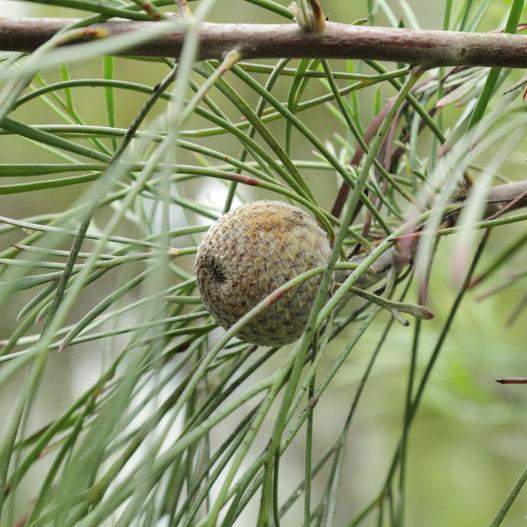Nepean Conebush
(Isopogon dawsonii)
Nepean Conebush (Isopogon dawsonii)
/
/

C T Johansson
CC BY-SA 3.0
Image By:
C T Johansson
Recorded By:
Copyright:
CC BY-SA 3.0
Copyright Notice:
Photo by: C T Johansson | License Type: CC BY-SA 3.0 | License URL: https://creativecommons.org/licenses/by-sa/3.0 | Uploader: Christer T Johansson | Publisher: Wikipedia Commons
































Estimated Native Range
Summary
Isopogon dawsonii, commonly known as Nepean Conebush, is an evergreen shrub native to the sclerophyll forests and heathlands of New South Wales, Australia. It typically reaches a height of 1 to 3 meters (3 ft 3 in to 9 ft 10 in) but can occasionally grow up to 5 or 6 meters (16 or 20 ft) in ideal conditions. The Nepean Conebush has a distinctive appearance with its pinnate leaves that have narrow segments and its spherical heads of creamy yellow to greyish white flowers that bloom in spring. The flowers are not particularly showy but are interesting in their form. This shrub is known for its hardiness, tolerating both drought and frost conditions.
In cultivation, Nepean Conebush is valued for its unique foliage and architectural form, making it a good choice for native plant gardens, urban landscaping, and as a feature plant in mixed borders. It thrives in full sun to part shade and requires low amounts of water once established, making it suitable for xeriscaping. It prefers soils with medium to fast drainage and can adapt to a range of soil types. While it is generally low-maintenance, it can be affected by root rot if overwatered or planted in poorly drained soils. The Nepean Conebush is also used as rootstock for grafting some Western Australian Isopogon species, which can be more difficult to cultivate on their own roots.CC BY-SA 4.0
In cultivation, Nepean Conebush is valued for its unique foliage and architectural form, making it a good choice for native plant gardens, urban landscaping, and as a feature plant in mixed borders. It thrives in full sun to part shade and requires low amounts of water once established, making it suitable for xeriscaping. It prefers soils with medium to fast drainage and can adapt to a range of soil types. While it is generally low-maintenance, it can be affected by root rot if overwatered or planted in poorly drained soils. The Nepean Conebush is also used as rootstock for grafting some Western Australian Isopogon species, which can be more difficult to cultivate on their own roots.CC BY-SA 4.0
Plant Description
- Plant Type: Shrub
- Height: 6-8 feet
- Width: 8-10 feet
- Growth Rate: Moderate
- Flower Color: Yellow
- Flowering Season: Spring
- Leaf Retention: Evergreen
Growth Requirements
- Sun: Full Sun, Part Shade
- Water: Low
- Drainage: Medium, Fast
Common Uses
Bee Garden, Bird Garden, Butterfly Garden, Low Maintenance
Natural Habitat
Native to the sclerophyll forests and heathlands of New South Wales, Australia
Other Names
Common Names:
Scientific Names: , Isopogon dawsonii,
GBIF Accepted Name: Isopogon dawsonii R.T.Baker